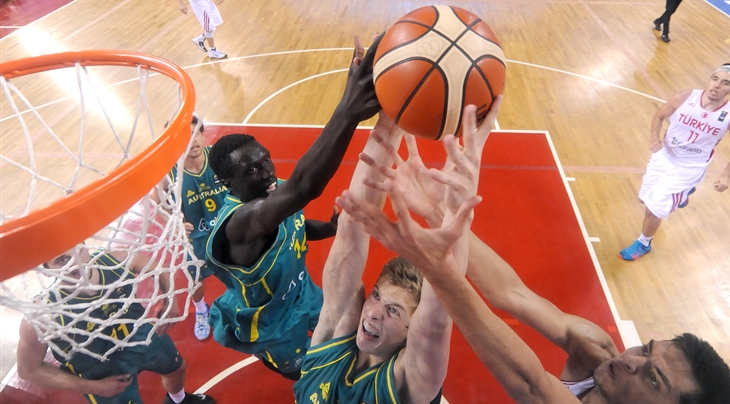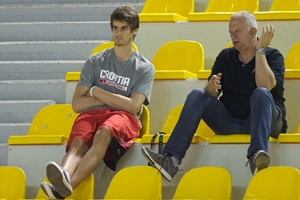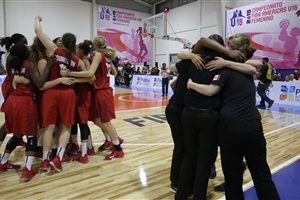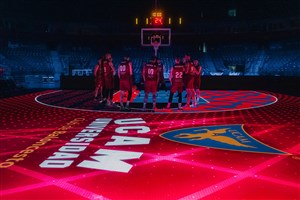
Emus' bumpy U19 ride
MELBOURNE (Paulo Kennedy's View from Downunder) - Ouch. That's the only way to describe the Emus' exit from the FIBA U19 World Championship overnight.
I'm sure some committed Aussie hoops fans felt like they had travelled back in time to the 2011 equivalent, when their team had matched a very good Serbian outfit for a half before being blown off the court in the third term.
It was even more painful for Australia's 2015 line-up, however, heading into a time-out midway through the third stanza with a 43-34 lead and all the momentum.
Deng Gak was dominating the keyway and the airwaves, while William McDowell-White was giving the Turkish guards fits.
Then, out of the timeout, Gak gives up his third foul and a three-point play, heads to the bench and the game changes.
In five minutes, the Turks peel off a 21-2 run and a spot in the semi-finals slips out of Emu reach.
Aussie coach Adam Caporn had some tough choices to make and no doubt he will spend much of tonight reliving those crucial moments in his mind.
His decisions not to take a time-out and to rest his guns as per usual rotations will no doubt be discussed in length by hoops junkies Downunder.
Every coach wants to be able to save time-outs until late in the fourth quarter, and no doubt Caporn was hoping his bench could limit the damage as they had earlier in the game, but the reality is the moment of truth came and went without the Aussies giving themselves a chance.
A pressing need
I don't need to tell most in Australia that it was Turkey who also finished the Boomers' run at last year’s World Cup.
On that occasion, the Aussies didn't play their own game, playing into their opponents' hands, but the same accusation can't be made of the Emus.
For much of the game they dared to be disruptive defensively, scrambled hard, pushed the ball in transition, attacked the rim and crashed the offensive boards.
The ironic thing was they came unstuck not being able to play against their own game.
The Turks threw out a half-court press to disrupt the Emus in the third quarter, who had quite a bit of success with that themselves.
Remarkably, the Aussies repeatedly failed to get a man to the middle of the press or ensuing zone, reducing their offence to a series of contested heaves and swinging the game 180 degrees.
Where the Aussies had been forcing Turkey to ad lib late in the shot clock, then punishing them on missed shots and rebounds with lightning movement in transition, suddenly it was the Turks getting scores in the open floor.
Had the Emus attacked the pressure and either got baskets or drawn fouls, the game probably would have played out very differently.
Had Tom Wilson not been lost to injury in the second term things may well have been different too. That kid seems to have that selfless, do anything and everything for the team attitude that is the trademark of Matthew Dellavedova, Damian Martin and Hugh Greenwood.
Impressive D
Much credit has to go to Caporn and his coaching crew for the way the team's defense improved over the course of the tournament.
In the early games the Emus were aggressive but they were too often reactive, chasing their men around like a caravan following a car, more worried about individual defence than working as a team.
But come the Round of 16 against Serbia and the defence looked like a finely tuned machine, moving as one at the right moments.
Whenever the Serbs thought they'd broken the pressure there always seemed to be more help in position and ready to defend, the Emus' willingness and ability to switch negating much of their opponent’s screening action.
The offense had made a similar transformation, the speed of movement a nightmare to defend, as was the intense focus on attacking the basket at the other end.
Their five out, 'horns set in fast forward' movement was perfect for a team with so many mobile forwards, particularly with Serbia unable to exploit that lack of size at the other end.
Tough Turkish test
The Turks presented a very different challenge for a number of reasons, but the most important one for mine was their determination to attack the Aussies' pressure defense.
Where the Emus had done a great job of containing and trapping cautious opponents, the hunter became the hunted thanks to Turkey's daring play.
That early aggression set the Emus up for the high pick-and-roll, their defense of that situation tentative early on having scrambled from early traps, allowing several easy baskets.
A big part of the issue was their reluctance to switch screens all across the court, as they had done so well against Serbia.
This allowed the Turks to play predictable offence, isolating the mismatch they wanted.
When the Aussies became more aggressive and more unpredictable, switching assignments and forcing Turkey to make reads on the run, it led to rushed shots, turnovers and scoring opportunities at the other end.
Full credit to the Emus for the way they turned things around in the second and third quarters, just a shame they didn't have an answer to that devastating third quarter run.
There is so much to take from this tournament that is relevant to all Australian men’s teams, given Boomers coach Andrej Lemanis' vision for a uniform style, so I’m going to revisit this next week, particularly with the UniRoos taking part in the Universiade.
Paulo Kennedy
FIBA
FIBA's columnists write on a wide range of topics relating to basketball that are of interest to them. The opinions they express are their own and in no way reflect those of FIBA.
FIBA takes no responsibility and gives no guarantees, warranties or representations, implied or otherwise, for the content or accuracy of the content and opinion expressed in the above article.


















